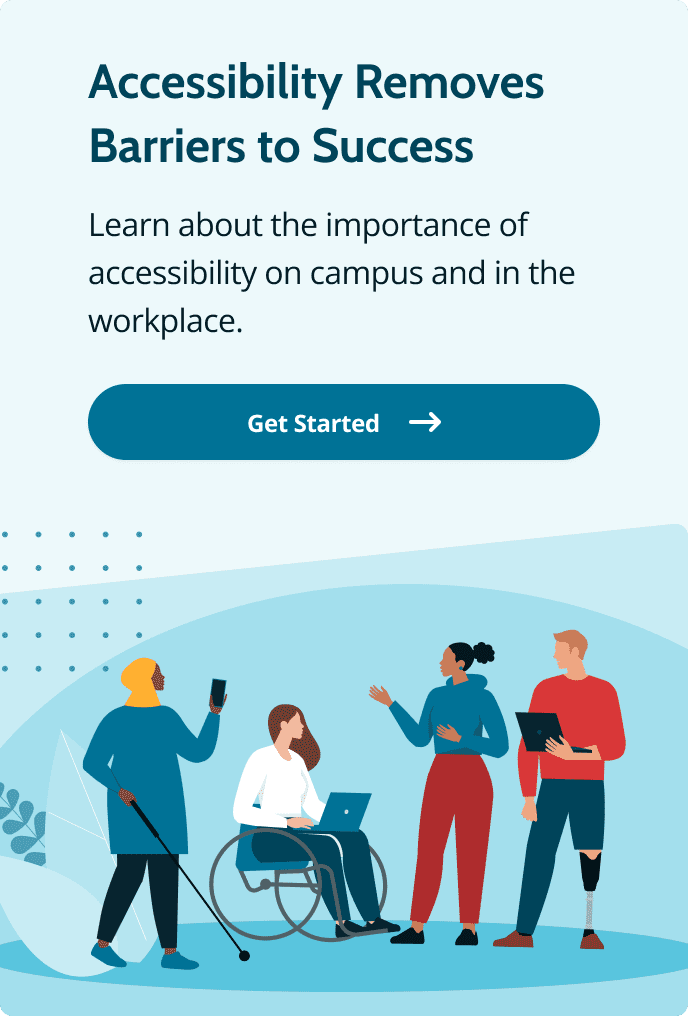Can You Use Your IEP in College?
Laws such as the Americans with Disabilities Act (ADA) and the Individuals with Disabilities Education Act (IDEA) are there to protect students’ rights and ensure access to accommodations. However, expecting that a student’s IEP will seamlessly follow them to college is a common misunderstanding.
Read on as we dive into the obstacles students face when trying to use their IEP and accommodations on a college campus. We will also highlight the crucial steps and available resources to support their academic achievements.
What Is an IEP?
Reauthorized in 2004 and amended in 2015, the Individuals With Disabilities Education Act (IDEA) ensures that students with disabilities ages 3-21 in public schools receive appropriate special education and related services. To ensure this, IDEA follows six key principles, one of which is an Individualized Education Plan (IEP). An IEP is a legally binding document created by a team that includes:
- The child’s parent or caregiver
- At least one of the child’s general education teachers
- At least one special education teacher
- A school psychologist or other specialist who can interpret evaluation results
- A district representative with authority over special education services
This team is responsible for reviewing the student’s learning goals, academic performance, and the services the school will provide. This team must review the IEP annually, allowing them to adjust the specialized academic instruction and accommodations needed to support the student.
IDEA and its principles only apply to students until high school graduation or age 21, whichever comes first.
Can You Use Your IEP Accommodations in College?
No, there is no special education placement or IEP in college. However, while the IEP process only applies to students until high school graduation, other laws protect the rights of disabled college students and their accommodations — and their IEP can be used as a starting point in obtaining those accommodations.
Section 504 of the Rehabilitation Act and the Americans With Disabilities Act (ADA) require colleges to provide accommodations for students with disabilities. The difference between these laws is that IDEA is a special education law. In contrast, Section 504 and ADA are civil rights laws.
Section 504 may sound familiar to students who followed a 504 plan in K-12. Students who may not have qualified for an IEP, as it has stricter eligibility requirements, could have followed a 504 Plan during their time in K-12 to receive accommodations.
The purpose of Section 504 is to provide services to enable students to learn alongside their peers. The primary difference in how Section 504 is utilized on a college campus is by who starts the process. In K-12, the responsibility falls on the school. In contrast, in college, the student must self-disclose and request accommodations.
How to Get Disability Accommodations in College
One of the main differences going from K-12 to college is that the responsibility of disability advocacy moves to the student. Parents and other guardians involved in the IEP process are no longer privy to students’ academic progress or needs.
The student is responsible for requesting accommodations and initiating the disability services process. Although your IEP does not follow you to college, it can be a useful tool when starting your journey with your college’s disability office.
Here are some key steps to help you turn your IEP plan into an accommodations request list for college.
Review Your IEP
One of the most crucial parts of an IEP or 504 Plan is the accommodations that provide disabled students with equitable access to the content that their peers have.
While an IEP also includes performance levels, student goals and information on classroom placement, the part of your IEP that you will want to review to help create the list of your requested accommodation will be under sections that may be named Accommodations and Modifications, Supplementary Aids and Services, Testing Adaptations, or something similar.
Reflect on what accommodations were imperative to your achievements and identify any unused accommodations.
It’s important to understand that while colleges are obligated to provide reasonable accommodations, the support you receive may vary from your K-12 experience. Taking the time to reassess your needs in preparation for your meeting with college disability services will help you navigate the transition smoothly.
Most Common Accommodations in College
Here’s a list of some of the most common accommodations utilized by college students.
- Additional Time on Exams: Sometimes, students are given time and a half to complete a test. For example, for a test that generally take one hour to complete, the student can take as long as 2.5 hours.
- Different Testing Location: This accommodation allows students to take an exam in a different learning environment, usually in a distraction-free space. Some colleges have testing centers specifically designed for this purpose.
- Exam Reader: Special technology can read exam questions and prompts to you. For example, Microsoft’s Immersive Reader can read the text aloud, highlight it as it reads, and provide a picture dictionary.
- Enlarged Print: Instead of using a 12- or 14-point font on an exam, assignment, or worksheet, you can ask for a larger font to make it easier to read.
- Extra White Space on Exams: When given an exam, you can ask for extra space — so instead of having 10 problems on a page, you have two pages with five problems each. The white space can be useful for jotting down ideas, solving a problem, or working out an equation.
- Preferred Seating: Sitting near the front or near the door during class to facilitate your learning is a common option for college students.
- Note Taker: This accommodation allows someone to take notes for you during class. For example, if you have limited use of your hands, you can request a note-taker for your courses.
- Digital Textbooks and Workbooks: Having a digital version of a textbook or workbook allows you to highlight, add notes, read aloud text to speech, zoom in, and use other digital accommodations. Some textbooks also have online portals that link to additional content, videos, and audio portions of the book.
- Preparation Materials: This accommodation allows students to access presentations or lecture content beforehand. This can be useful for students who need it to be prepared on a screen or e-reader or for students who may need visual aids to be able to absorb lecture material.
Schedule a Time With Disability Services
To request disability accommodations in college, you must first meet with the disability services coordinator at your school. This should be done as soon as you commit to your college to ensure you have ample time to get any extra paperwork the disabilities services office may need.
The disability services office works with students — such as those with a learning disability, sensory processing disorder, or attention deficit hyperactivity disorder — who require academic accommodations. The office also assists individuals with permanent and temporary physical disabilities, autism spectrum disorder, or chronic health problems.
When scheduling your meeting, ask if your IEP will suffice as needed documentation to receive accommodations. Some colleges will accept a high school IEP as documentation of a disability, whereas others might ask for a recent letter from your health provider.
Prepare for Your Meeting
Bring any evaluation or assessment data when you meet with the disability services coordinator. Be sure to request any accommodation you may need for the meeting, such as modified text on paperwork.
This initial meeting will set the framework for your accommodation needs for your college experience. You want to ensure you’re able to understand everything discussed. Be prepared to discuss the following:
- Your disability and how it impacts your learning and daily life
- Your areas of need
- Documentation and assessments related to your disability
- A summary of accommodations and modifications you’ve used in the past that worked (and didn’t work)
The disability services office evaluates each student individually. Even though students may have the same disability, accommodations may differ to meet their individual needs.
For example, one student may benefit from testing in a different room, while another may require more time to complete the test.
Students with disabilities can choose to remain anonymous in higher education, so self-advocacy is essential. Remember, it is up to the student to meet with the disabilities services office to start the process of obtaining accommodations.
If you’re having difficulty in courses, struggling to manage your time, or feeling overwhelmed, it’s recommended that you seek support from disability services.

Communicate With Your Professors
Regarding notifying professors about these accommodations, disability services offices typically handle the first step in this communication process. Ask your disability services coordinator how and if they notify instructors.
Professors are usually informed confidentially and discreetly about the specific accommodations necessary for individual students. Notification from you or the disability service office does not need to reveal the nature of your disability or identify your reasons for the accommodations to your instructor.
“It’s very important to be transparent about your needs with your instructors. Our goal is to help you succeed in class — we are on your side. So please let us know how we can best assist you.”
In addition to any notifications sent from the disability services offices, it’s best if you also reach out to your professor to review what your accommodations mean in their classroom and how to best communicate with them when you need to use them. You can reach your professor via email or by visiting during office hours.
For example, your university may require your instructor to fill out a form whenever a test is scheduled to allow the disability office to find a quiet space for you to test.
Here’s an example of how you could write an email letting your professor know you require disability accommodations:
Dear Dr. Rayes,
I’m Charlie Shephard, a student in SOC 101 on Monday, Wednesday, and Friday from 8 a.m. to 9 a.m. I’m reaching out to let you know that I’m currently receiving services from the Office of Disabilities.
The following accommodations are needed in your class: extended time on tests, testing in a separate room, and a test reader.
I understand that it may be helpful for us to have a conversation to discuss how these accommodations can be best implemented in the course. I am available to meet during your office hours or at a time that is convenient for you. Alternatively, if you prefer another mode of communication, such as email or phone, please let me know.
Thank you,
Charlie Shephard
Remember to self-advocate for what you need. And always be upfront with your professors. Using these tips and strategies, you can get the accommodations you need to succeed in college, even without an IEP.
Disclaimer: The information provided on this website is not intended or implied to be a substitute for professional medical advice, diagnosis, or treatment; instead, all information, content, and materials available on this site are for general informational purposes only. Readers of this website should consult with their physician to obtain advice with respect to any medical condition or treatment.




